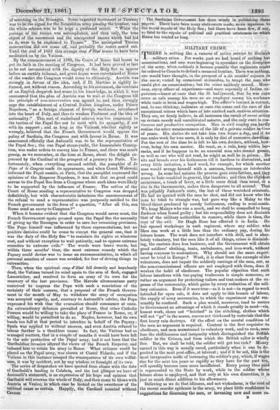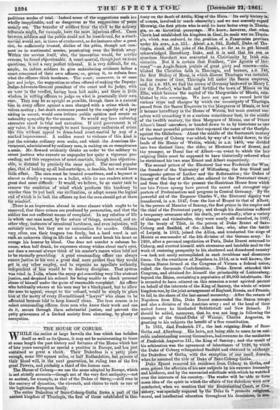MILITARY CRIME.
FriliERE is nothing like a rumour of active service to diminish
military crime. For weeks past we had. heard of nothing but assassinations, and men were beginning to speculate on the discipline of the army, when suddenly it became possible that regiments might be ordered to Canada to defend a menaced frontier. There was nothing, one would have thought, in. the prospect of a six mouths' sojourn in the snow, varied by occasional skirmishes, to tempt the Mall who could plot anassassination;, but the crime suddenly ceased. More- over, every. officer of experience—and more especially of Indian ex- perience---knew at,once that the fit had fpassed, that lie was on:pe more as safe among his men..as an employer among his workmen while trade is brisk and wages high. The officer's instinct is correct, and, to our thinking, indicates at once the cause and the care of the exceptional crimes which have of late excited such anxious attention. They are, we firmly believe, in rill instances the result. of ennui acting on certain, moody an uncultivated natures, and the only cure is con- tinuous and productive occupation. Men in civil employ, can hardly realize the utter wearisomeness of the life of a private soldier in time of peace. His duties/4o not take him, two hours a day, and if he can make work for two more, it is only, by dint of excessive dawdling. Foe the rest of the time he,is left to his own. devices, without, how- ever, being his own master. He must, as a rule, keep within bar- racks, anrl if he -happens to be an unsocial man who cannot gossip, as well as one who will not read, he might as well be in prison. Ile sits and broods over his listlessness till it hardens to discontent„ and every little irritation, a hard word, for example, for which another man would .avenge himself with a sarcasm, becomes, an intolerable wrong, In, some bad natures the process goes even farther, and, come to hate Mankind in general, like lunatics ; and then the sligh occurrence, a touch of fever, or a little more drink than usual, or a rise in the thermometer, makes them dangerous to all around. That was palpably Jackson's state, the last of these wretched criminals. He had no quarrel with the man he shot, and did not know who the man he tried to strangle was, but gave way like a Malay to the blood-thirst produced by moody listlessness, ending in semi-mania. We hang Malays who run a muck, and we shall be compelled to hang Jackson when found guilty; but his responsibility does not diminish that of the Military authorities to remove, while there is time, the root of the evil: Sir Hugh Rose has effected it in India. He hit's opened workshops in each regiment, where any soldier who likes can work at a little less than the ordinary pay, during his leisure hours. The work does not interfere with drill, and is abso- lutely voluntary, but the men like it of all things, crime is diminish- ing, the canteen does less business, and the Government will obtain good soldiers' clothing, tents, ambulances, and iron-work, without having recourse to contractors. Why should not the same experi- ment be tried in Europe ? Work, it is clear from the example of the volunteers, does not impair the soldierly carriage of the men, nor, as the non-commissioned officers are not employed with them, does it weaken the habit of obedience. The popular objection that such labour interferes with tax-paying tradesmen is simple nonsense, or rather an argument for protecting tailors and tent-makers at the ex- pense of the community, which gains by every reduction of the mili- tary estimates. Even if it were true—as it is not—in regard to work intended for open sale, it does not apply to this branch of labour, the supply of army necessaries, to which the experiment might rea- sonably be Confined. Such a plan would, moreover, tend to secure to Government an advantage of which it stands greatly in need—viz, honest work, shoes not "botched" in the stitching, clothes which will not "go" in the seams, canvas not thickened by materials that the first heavy rain destroys. Of the effect on the mental condition of the men no argument is required. Content is the first requisite to obedience, and men accastomed to voluntary work, and to cook, soon lose the shiftlessness and incapacity which distinguished the British soldier in the Crimea, and from which the British sailor is wholly free. But, we shall be told, the soldier will get too rich? Money earned in this way is usually saved, particularly when it can be de- posited in the next post-office, at interest ; and if it be not, this is the most inexpensive mode of increasing the soldier's pay, which, if wages rise for the next ten years as rapidly as they have for the past ten, will speedily become once more insufficient. Every penny thus paid is represented to the State by work, while to the soldier whose leisure alone is employed, and that only at his own discretion, it is just so much direct addition to his allowances.
Believing as we do that idleness, and not wickedness, is the root of the recent murder epidemic in the army, we place little confidence in suggestions for disarming the men, or inventing new and more ex- at peditious modes of trial. Indeedienme of the suggestions made are wholly inapplicable, and as dangerous as the suggestions of panic usually are. The transfer of soldiers from the civil to the military tribt4IA'tnht, for example, hate, ,t4ims,t3iiiijiginRAigfeep,.. Cases Izety*oldiers and the public could ,notim, transfer*, for a-court-, martejar,wotild not, in times of excitement, as forinstanceufter a great riot, be sufficiently trusted, dislike of the pain, though not ■real,-) pant w in continental armies; penetrating even the British JitAnil' Within the service itself,ualsb/- the innovation would, for nerifee!, reasons, be found objectionablelA. court-inartial, though just ofiNoiiie; questions, is not a very perfect' tilbunal. It is very difficult, Air., e't.rir; ample, to induce soldiers to give unhesitating evidence before -a court composed of their own officers; or, giving it, to refrain from, what the officers think insolence. The- court, moreover, is at once: jury and judge, the suggeetion so often offered of making the DeputyL. Judge-Advocate-General president of the court and its judge, with no vote in the verdict, having been laid aside; and there is little wisdom in setting officers to judge on what is practicallY.their own Ilt Noe-. They may be as upright as possible, though, there is a natural bete.* every officer against a man charged with a crime which in- vaveli.mutiny ; but death sentences passed by the majority of a jury sitting in secret; would soon irritate public opinion and create- an unhealthy sympathy fertile assassin. So would any laws 'enforcing extessive speed in trial and execution. If civil government is of any value, it is- strong enough to meet temporary outbursts of crime like this witheint appeal to drum-head court-martial by way of a marked improvement. A. sudden resort to violence of this kind is just the mistake -ordinary Men make,. and which the American Go- verament, administered by ordinary men, is making on so conspicuous a:scale. Mr. Seward evidently thinks an order to the military to arrest justices who execute an unpopular law quite a vigorous pro- ceeding, and this suggestion of court-martials, though less objection- able, is dictated by precisely the same spirit. The second popular plan; thati pr locking up all ball-cartridges, is feasible, but ,would have little effeettJike Men must be trusted- sometimes, and a bayonet is almost as deadly a weapon as a bullet, while its use renders' arrest a great deal more difficult. It *ell& We believe, be an easier task' to retrieve the condition of mind' which produces this tendency to murder than to put back our civilization, or adopt means the logical end of which is to lock the officers up lest the men should get at them for mischief.
There is an impression abroad in some classes which ought to be removed, that these crimes are produced by persecution, and that the saldier has not sufficient means of complaint. In any relation of life in which one man must, by the nature of things, command, and an- other obey, instances of occasional harshness, and even injustice, will certainly occui,tat'they are no extenuation for murder. Officers very often uaa,:their tongues too freely, but a hard word is not such an unknown thing in life that a soldier need break his heart or avenge his honour by blood. One does not murder a cabman lbe-i cause, when half drunk, he expresses strong wishes about one's eyes, nor does a servant'always think of his master's razors whentold not to be eternally grumbling. A good commanding offiCer can always ensure justice to his men a great deal more perfect than they would get in any other employ, and to organize an appellate aut1a444, independent of him would be to destroy discipline. That system was tried in India, where the sepoy got something verylike abstract justice, and despised his oolonel for being unable to check personal abuse of himself under the guise of reasonable complaint. An officer who habitually sWears at his'men'inay'he a blackguard, but to allow the men to appeal, except to the 'colonel, Wciuld be simply to place him at the mercy of every iTconditioned "lawyer" who chose to be affronted because told to keep himself clean. The true course is to select commanding officers from men who know their work and can do it, secure through theni substantial justice, and prevent the petty grievances of a limited society from ulcerating, by plenty of occupation.































 Previous page
Previous page